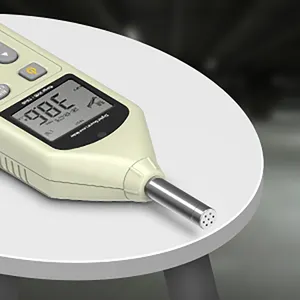Introduction to Industrial Sound Level
The industrial sound level is a crucial measurement in various sectors, as it helps assess the intensity of sound in industrial environments. With an increasing emphasis on workplace safety and compliance with noise regulations, understanding sound levels is vital for protecting workers’ hearing and enhancing operational efficiency. This product description will delve into the types, functions and features, applications, and advantages of utilizing industrial sound level meters.
Types of Industrial Sound Level Meters
There are several types of industrial sound level meters designed to cater to different needs and environments. Here’s a closer look at these variations:
- Handheld Sound Level Meters: Portable devices ideal for field measurements in various industrial settings.
- Fixed Sound Monitoring Systems: Permanent installations that continuously monitor sound levels across large facilities.
- Integrating Sound Level Meters: Advanced instruments that provide average sound levels over a specified time period, useful for detailed analysis.
- Real-time Noise Dosimeters: Wearable devices that track sound exposure for individual workers, promoting personal safety.
Function and Features of Industrial Sound Level Meters
The industrial sound level meters are equipped with various features designed to ensure accurate sound measurement and data collection. Some notable functions include:
- Measurement Range: These meters typically measure decibel levels ranging from 30 dB to 130 dB, suitable for both quiet and loud environments.
- Frequency Weighting: Options such as A-weighting and C-weighting facilitate different measurement contexts, allowing for tailored assessments of sound impact.
- Data Logging: Many models come with built-in memory or connectivity to external devices for data logging and analysis purposes.
- Calibration Features: Regular calibration is essential for accuracy. Some meters offer automatic calibration settings to ensure reliable results.
Applications of Industrial Sound Level Meters
The use of industrial sound level meters spans various industries and applications, highlighting their versatility. Key applications include:
- Workplace Safety: Regular monitoring helps prevent hearing loss among workers in noisy environments.
- Compliance Testing: Ensuring adherence to local regulations and standards for noise levels in industrial settings.
- Environmental Monitoring: Assessing noise pollution in surrounding areas, particularly for industries near residential zones.
- Research and Development: Used in laboratories and research settings to study sound impact and formulate acoustic solutions.
Advantages of Using Industrial Sound Level Meters
The implementation of industrial sound level meters offers numerous advantages for businesses and workers. These include:
- Enhanced Safety: Regular monitoring can significantly reduce the risk of noise-induced hearing loss and enhance overall workplace safety.
- Improved Productivity: Lower sound levels contribute to a better work environment, aiding concentration and effectiveness among workers.
- Compliance with Regulations: Helps businesses avoid penalties and maintain standards set by environmental and occupational health authorities.
- Long-term Cost Savings: Investing in sound monitoring can reduce health-related costs and improve employee morale, leading to better retention and productivity.




















































